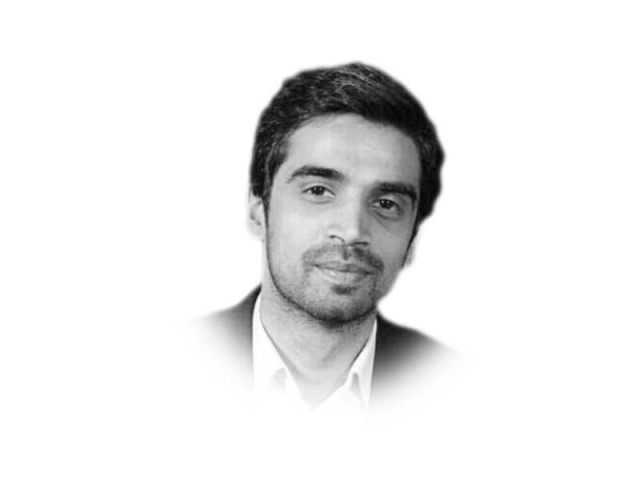Speak, for you are free
For us to progress (collectively or individually), we need to strive towards a tolerant society

The writer is a practising lawyer based in Lahore and can be contacted at @ch_aitzazaslam
Every citizen of the state has the right to freedom of speech and expression, as protected under Article 19 of the Constitution of Pakistan. Freedom of speech and expression is one of those fundamental rights, which are considered to be the cornerstone of democratic institutions.
For those, who are not familiar with their constitutionally protected freedom of speech and expression, Article 19 states: “Every citizen shall have the right to freedom of speech and expression, and there shall be freedom of the press” unless the freedom of speech impinges upon “the glory of Islam or the integrity, security or defence of Pakistan.” Therefore, this constitutionally protected right of every citizen of the state is limited, but the extent to which free speech could be curtailed is rather unclear. This uncertainty also reflects the wisdom of those who framed the Constitution because what is unacceptable today may not be the same after a certain period of time, as evolution, and with it change, is constant.
It is undeniably true that the right to free speech cannot be absolute as is also the case in most democracies of the world. It is clear that it is not an unfettered right. Freedom of speech and expression cannot be exercised to the extent that an individual is permitted to break all ‘reasonable’ barriers imposed by law, in order to maintain security, peace, and harmony within society. However, neither have the institutions of the state been successful in stating what exactly is or is not against “the glory of Islam or the integrity, security or defence of Pakistan”, nor have we, as a nation, made concerted efforts to ensure that our constitutionally protected freedoms are not arbitrarily restricted.
Since the contours of such a fundamental right in our country are blurred, the state knows no limit when it comes to limiting free speech. Faiz sahab’s “Yeh dagh dagh ujala, yeh shab gazeeda sahar … woh intezar tha jiska, yeh woh sahar toh nahi” was held to be against the integrity and security of Pakistan and became the reason for his exile. Habib Jalib was also banned from the media for writing “Dastoor”. Salmaan Taseer’s courage and valour cost him his life. And just a few weeks ago, we lost another advocate of free speech, someone who had the audacity, and someone who dared to speak up for others — Sabeen Mahmud.
Such people, without paying any heed to the threats they receive, continue to raise their voices and question the status quo. They are labelled ‘cynical’ and at times over-critical due to their ability to not only question the state’s policies but to also say it all loud and clear.
Such blood-soaked chapters of our history force me to raise my voice against prevalent injustices in our society, especially because as a lawyer, I have taken a solemn oath to uphold the dignity of law. For us to progress (collectively or individually), we need to strive towards a tolerant society. A society where questioning the unquestionable is not a crime; where limiting free speech, with the aim of preserving the integrity of institutions is not a defence; and where being privileged does not guarantee redemption.
Many have been behind bars for speaking their mind or sentenced to death without being afforded an opportunity of being heard fairly, in accordance with law. While the state wishes to determine the boundaries of what is permissible or what is not permissible under the right to freedom of speech, it clearly fails to maintain balance with other competing rights, such as the right to life.
Seems like a dharna alone is the ‘secure’ way of registering protest in the country. The primary issue, which then arises, is that, are we only allowed to register protest by forming multiple rows, with flags in our hands and paints on our faces, behind a leader, who can utter whatever he wants? Are our individual efforts to throw off the shackles of fear sufficient? Do we have the courage to unite supporters to bring about any change through peaceful opposition? Or will our future generations continue to bow before the idols of clay, without recourse?
Let’s resolve — before it is too late — to stand united against the cold-blooded murder of any citizen of the state, if the only crime that individual has committed is of exercising their right to free speech. For it is our silence and fear that is directly or indirectly continuing to silence many of our own, in the name of protecting and safeguarding the interests and sovereignty of the country. By not practising our right to disagree, we are on our way to bringing back and encouraging the Ziaul Haq(s) of the past and dictatorship-like-democracies, to lead us into darkness. We must be brave enough to revive within us and make space for the Faiz(s) and Jalib(s) of this era.
Bol, ke sach zinda hai ab tak…
Published in The Express Tribune, May 23rd, 2015.
Like Opinion & Editorial on Facebook, follow @ETOpEd on Twitter to receive all updates on all our daily pieces.















COMMENTS
Comments are moderated and generally will be posted if they are on-topic and not abusive.
For more information, please see our Comments FAQ